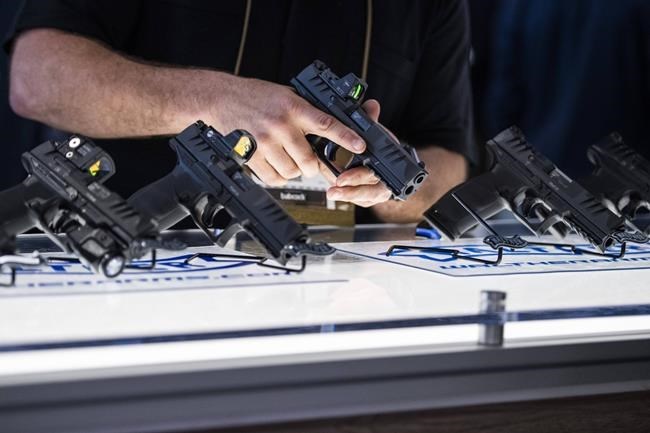
Senators have passed a gun-control bill that cements restrictions on handguns, increases penalties for firearm trafficking and aims to curb homemade ghost guns. A Walther PDP pistol is shown by a vendor that provides weapons to government, military and law enforcement clients, at the CANSEC trade show, billed as North America’s largest multi-service defence event, in Ottawa, Wednesday, June 1, 2022. THE CANADIAN PRESS/Justin Tang
Republished December 14, 2023 - 4:23 PM
Original Publication Date December 14, 2023 - 2:56 PM
OTTAWA - Senators have passed a government bill that cements restrictions on handguns, increases penalties for firearm trafficking and aims to curb homemade ghost guns.
The bill ushers in new measures to keep firearms out of the hands of domestic abusers and increases maximum penalties for gun smuggling and trafficking to 14 years from 10.
The legislation, known as Bill C-21, also includes a ban on assault-style firearms that fall under a new technical definition. It would apply to such guns designed and manufactured after the bill comes into force.
Under the bill, a prohibited firearm also includes “any unlawfully manufactured firearm regardless of the means or method of manufacture," a measure aimed at homemade ghost guns.
Senators voted 60 to 24 in favour of the bill at third reading Thursday.
Upon introducing the bill last year, the Liberals announced a plan to implement a freeze on importing, buying, selling or otherwise transferring handguns to help reduce firearm-related violence.
Federal regulations aimed at capping the number of handguns in Canada are now in effect, and the bill contains provisions that would reinforce the freeze.
The House of Commons passed the bill 207 to 113 last spring with the support of Liberal, NDP, Bloc Québécois and Green members of Parliament.
The Conservatives and some gun owners firmly opposed the legislation, saying it penalizes law-abiding firearm users instead of targeting criminal gun violence.
In the Senate this week, Opposition leader Don Plett called the legislation "an inherently bad and divisive bill for Canada."
"But if we are going to be honest, colleagues, I think we need to accept that this government actually intended this bill to be divisive," the Conservative senator said. "That is because they view this bill as a wedge for the Liberal party in the next election."
Plett said the handgun freeze would do nothing to reduce gun crime. "Instead, it will only succeed in destroying competitive shooting sports in Canada for absolutely no benefit."
However, senators ultimately approved the bill without amendment.
Survivors and victims of some of the worst mass shootings in Canada welcomed the development.
Nathalie Provost, who was wounded in the 1989 École Polytechnique mass shooting in Montreal, said the bill's provisions will save many lives.
“Bill C-21 contains solid measures to better protect victims of domestic abuse from gun threats and violence," said Provost, spokesperson for gun-control group PolySeSouvient.
Boufeldja Benabdallah, co-founder of the Quebec Mosque, the site of a deadly 2017 shooting, applauded the handgun restrictions.
“Although it’s not a total ban, we are very happy about the freeze on new handgun purchases, as this is an important step in the right direction."
PolySeSouvient cautioned that the potential public safety benefits of most of the key measures will depend on forthcoming regulations that will flesh out the details.
The group also took issue with the new definition of prohibited weapons in the bill because it applies only to future models "and is easily circumventable."
Hundreds of models of assault-style firearms remain legal, the group said.
Public Safety Minister Dominic LeBlanc has said the government will re-establish the Canadian Firearms Advisory Committee to independently review the classification of existing models that fall under the new definition of a prohibited firearm in the bill.
He told senators in October the exercise would identify guns legitimately used for hunting, which would be excluded from the ban.
LeBlanc said the government would also implement a long-planned buyback of 1,500 firearm models and variants banned through order-in-council in May 2020.
In addition, the government plans to enact regulations to ensure a comprehensive ban on large-capacity magazines.
This report by The Canadian Press was first published Dec. 14, 2023.
News from © The Canadian Press, 2023